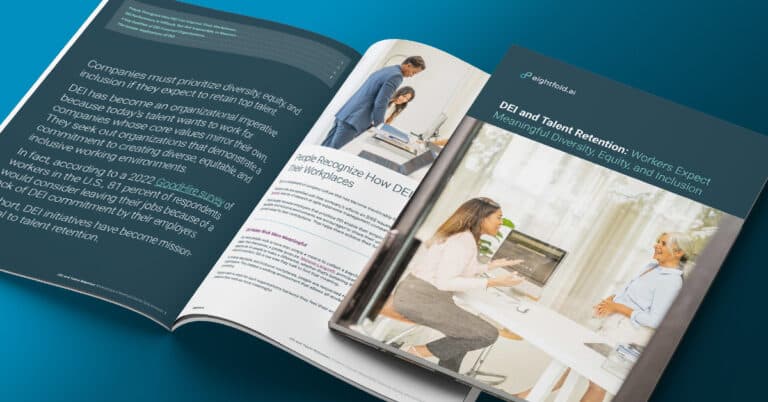
DEI and talent retention
DEI and talent retention
DEI has become an organizational imperative because today’s talent wants to work for companies whose core values mirror their own.
They seek organizations that are committed to creating diverse, equitable, and inclusive working environments.
In fact, according to a 2022 GoodHire survey of workers in the U.S., 81 percent of respondents would consider leaving their jobs because of a lack of DEI commitment by their employers. In short, DEI initiatives have become mission-critical to employee retention.
In this report, you’ll read about:
- How people recognize DEI can improve their workplaces
- DEI performance: difficult, but not impossible, to measure
- 4 key qualities of DEI-focused organizations
- The greater implications of DEI
Companies must prioritize diversity, equity, and inclusion if they expect to retain top talent.
DEI has become an organizational imperative because today’s talent wants to work for companies whose core values mirror their own. They seek out organizations that demonstrate a commitment to creating diverse, equitable, and inclusive working environments.
In fact, according to a 2022 GoodHire survey of workers in the U.S., 81 percent of respondents would consider leaving their jobs because of a lack of DEI commitment by their employers.
In short, DEI initiatives have become missioncritical to talent retention.
People Recognize How DEI Can Improve Their Workplaces
DEI is a component of company culture that has become inextricably linked to employee satisfaction and, therefore, retention .
“Workers who are satisfied with their company’s efforts on [DEI] issues are actually happier with their jobs,” writes Laura Wronski, director of research at agile experience management company Momentive.ai .
That’s largely because employers that prioritize DEI enable their employees to be their best selves. People who work in diverse, equitable, and inclusive environments are encouraged to share their unique perspectives, so they feel more respected on the job and valued for their contributions. That helps them achieve their full potential.
DEI Makes Work More Meaningful
For many people, work is more than simply a means to collect a paycheck . They see work as a way to contribute to something bigger than themselves, a greater purpose, Melanie Langsett, principal in Deloitte’s Human Capital practice, et al. write. It’s an opportunity for people to make a difference, whether that’s bettering the company, impacting societal change, or improving the lives of coworkers. DEI is one area they look to find that meaning.
In diverse, equitable, and inclusive workplaces, people are respected for their differences and the value they bring to the organization. This creates a working environment that allows all workers to thrive, which makes them happier and more productive .
People want to work for such organizations because they feel their work contributes to the creation of that environment. They perceive their work as more meaningful.
DEI Facilitates Workplace Fairness
People expect everyone in a company to be treated equally and fairly regardless of age, race, gender, or sexual orientation. When DEI is a core value, people have confidence that their organization emphasizes the importance of equality and fairness. That leads to greater satisfaction and employee retention .
“Diverse and inclusive workplaces earn deeper trust and more commitment from their employees,” notes Matt Bush, principal strategic advisor at Great Place to Work. In fact, research by that organization found that when employees trust that everyone at the workplace will be treated fairly, they are 5 .4 times more likely to want to stay a long time at that business.
DEI Helps People Build New Skills
Developing new skills is important for forward-thinking workers who want to grow in their careers . Working in diverse, equitable, and inclusive environments helps people build new skills that will aid them at different phases of their careers .
“If you are working in a diverse and inclusive environment, you will automatically be exposed to a wider range of different opinions, ideas and skills far more regularly,” explains Yvonne Smyth, head of diversity and inclusion at Hays. “This, in turn, will allow you to open your mind and become more curious about different ways of thinking . You will also be more likely to learn new skills from your colleagues.”
Happiness at work is key to talent retention, and DEI is critical to job satisfaction. By focusing on meaningful DEI, employers create environments in which employees feel as though they belong and their work matters, which motivates them to be loyal to the company .
You might also like...
Get the latest talent news in your inbox every month
By submitting this form, I consent to Eightfold processing my personal data in accordance with its Privacy Notice and agree to receive marketing emails from Eightfold about its products and events. I acknowledge that I can unsubscribe or update my preferences at any time.
